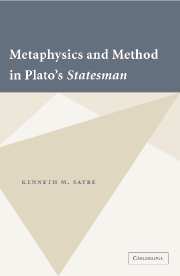Book contents
- Frontmatter
- Contents
- Acknowledgments
- Introduction
- PART I METHOD
- PART II METAPHYSICS
- 7 Excess and Deficiency in General
- 8 The Great and the Small in Plato's Dialogues
- 9 The Generation of Everything Good and Fair
- 10 Accuracy in the Art of Dialectic
- 11 Division According to Forms
- 12 The Metaphysics of Division
- Appendix: Equivalents for the Great and the Small in Aristotle and His Commentators
- Bibliography
- Index Locorum
- Index of Names
- General Index
8 - The Great and the Small in Plato's Dialogues
Published online by Cambridge University Press: 23 November 2009
- Frontmatter
- Contents
- Acknowledgments
- Introduction
- PART I METHOD
- PART II METAPHYSICS
- 7 Excess and Deficiency in General
- 8 The Great and the Small in Plato's Dialogues
- 9 The Generation of Everything Good and Fair
- 10 Accuracy in the Art of Dialectic
- 11 Division According to Forms
- 12 The Metaphysics of Division
- Appendix: Equivalents for the Great and the Small in Aristotle and His Commentators
- Bibliography
- Index Locorum
- Index of Names
- General Index
Summary
The Purpose of This Chapter
Chapter 7 identified seven expressions used equivalently by Aristotle and his commentators for Plato's (the) Great and (the) Small. All but two of these appear in the Platonic dialogues. Of the five used by Plato, occurrences of ὑπεροχή καὶ ἔλλειψις (Excess and Deficiency) and τὸ μέγα καὶ τὸ μικρόν (the Great and the Small) are found in the Statesman. The remaining three, τὸ ἄπειρον (the Unlimited), τὸ μᾶ̃λλον καὶ ἧ̃ττον (the More and Less), and ἡ ἀπείρον φύσις (the Unlimited Nature, or the Nature of the Unlimited), occur in the Philebus. The tactic of the present chapter is to examine the use of these expressions in the latter dialogue in hopes of elucidating the nature of Excess and Deficiency in the middle section of the Statesman.
Merely knowing that these three expressions occur in the Philebus, of course, tells us little about their meaning in that particular context. Of the three, τὸ ἄπειρον has received the most extensive discussion. Ancient commentary begins with Aristotle, who says in the Physics that Plato made the Infinite (or Unlimited) a substance in its own right (203a4–5), that it is present both in the Forms and in sensible things (203a8–10), and that Plato had “two infinites,” the Great and the Small (203a15–16). Commenting on these and adjacent passages, Simplicius equates the Infinite with the Indefinite Dyad and the Great and Small on Plato's behalf (see Appendix). Similar connections are made by Alexander, Themistius, and Philoponus (see Appendix).
- Type
- Chapter
- Information
- Metaphysics and Method in Plato's Statesman , pp. 154 - 170Publisher: Cambridge University PressPrint publication year: 2006

